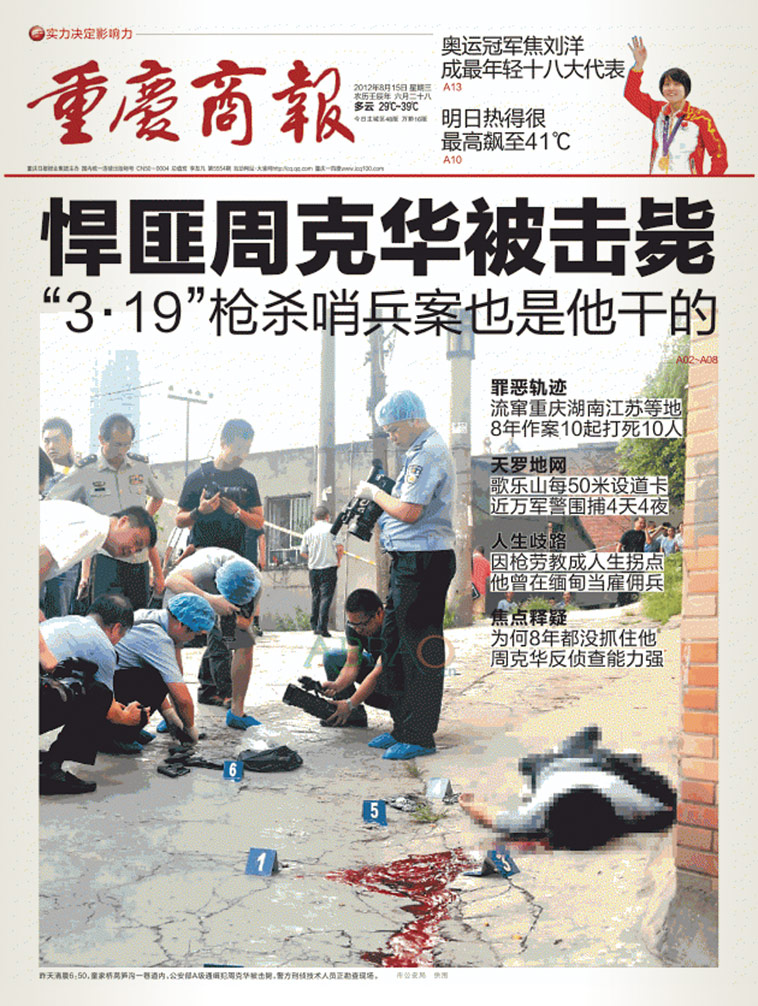
Front page news in Chongqing on 15 August, 2013: the shooting of the serial killer Zhou Kehua.
Source: Chongqing Shangbao
Zhou Kehua was a Chinese armed robber and fugitive wanted in connection with crimes dating back to 2004. He was suspected of committing multiple homicides and armed robberies; reports variously attribute between eight and twelve deaths to him. He was also wanted on a charge of ‘committing a terrorist act’ after he was alleged to have shot and killed a PLA sentry before stealing his rifle in 2009. He committed his crimes across the country, from Nanjing to Changsha, but ended up being shot dead by police in his home city of Chongqing.
According to media reports, Zhou is believed to have committed his first murder in 2004. Prior to that, he was twice jailed for stealing and illegally carrying firearms. Media reports say that sometime before 2004, he worked as a mercenary soldier in Burma, which explains his familiarity with guns. He was nicknamed ‘Brother Headshot’ (baotouge 爆头哥) for his habit of shooting his victims in the head at point-blank range.
On 10 August 2012, armed with a handgun, Zhou robbed customers coming out of a bank in Chongqing. He shot two people dead and injured one at the bank, and killed a police officer as he fled the scene. The crime triggered the largest man-hunt in China in recent years, involving thousands of police officers and soldiers. Four days later, on 14 August 2012, Zhou was spotted in Chongqing’s Shapingba district by the police and was shot dead in an exchange of fire.
The man-hunt came a few months after the sacking of Bo Xilai. Chongqing’s former party chief had been known for his tough-handed crackdowns on criminal gangs in the city before his political fall and detention in early 2012. The timing of the man-hunt prompted speculation that it was intended in part to reassure local people that security in Chongqing would not worsen after Bo was removed from his position.
That it took the authorities almost nine years after the first murder to capture Zhou drew criticism for inefficiency, though some media reports emphasised that Zhou’s mastery of disguise and survivalist skills had made capture very difficult. A number of reports said that Zhou had been spotted camping in a graveyard in Nanjing and that he was used to living in the mountains. He often fled the scene of his crimes by taking a pedicab, shunning the riskier public transit system and never staying in hotels. He rarely used mobile phones.
Immediately after his death, photos showing a dead body lying face down in blood appeared on the Internet. The photos fed various conspiracy theories, including one that disputed the official account of his death, arguing that Zhou committed suicide. Others proposed that the dead man in the picture was not Zhou, but a plain-clothes police officer who was killed when his colleagues mistook him for the fugitive. Despite the plethora of media accounts, there does not seem to be an authoritative account of Zhou’s life and crimes.
On 22 March 2013, Zhang Guiying, Zhou’s girlfriend, was sentenced to five years in prison for concealing stolen property.


